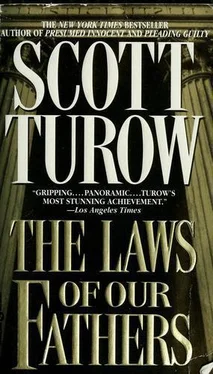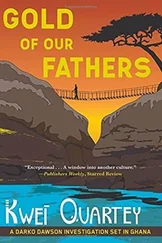Scott Turow - The Laws of our Fathers
Здесь есть возможность читать онлайн «Scott Turow - The Laws of our Fathers» весь текст электронной книги совершенно бесплатно (целиком полную версию без сокращений). В некоторых случаях можно слушать аудио, скачать через торрент в формате fb2 и присутствует краткое содержание. Жанр: Криминальный детектив, на английском языке. Описание произведения, (предисловие) а так же отзывы посетителей доступны на портале библиотеки ЛибКат.
- Название:The Laws of our Fathers
- Автор:
- Жанр:
- Год:неизвестен
- ISBN:нет данных
- Рейтинг книги:5 / 5. Голосов: 1
-
Избранное:Добавить в избранное
- Отзывы:
-
Ваша оценка:
- 100
- 1
- 2
- 3
- 4
- 5
The Laws of our Fathers: краткое содержание, описание и аннотация
Предлагаем к чтению аннотацию, описание, краткое содержание или предисловие (зависит от того, что написал сам автор книги «The Laws of our Fathers»). Если вы не нашли необходимую информацию о книге — напишите в комментариях, мы постараемся отыскать её.
The Laws of our Fathers — читать онлайн бесплатно полную книгу (весь текст) целиком
Ниже представлен текст книги, разбитый по страницам. Система сохранения места последней прочитанной страницы, позволяет с удобством читать онлайн бесплатно книгу «The Laws of our Fathers», без необходимости каждый раз заново искать на чём Вы остановились. Поставьте закладку, и сможете в любой момент перейти на страницу, на которой закончили чтение.
Интервал:
Закладка:
The early months of 1970 were terrible. We were in California's first season, whatever it's called. The acacias had bloomed; the purple ice plants flowered beside the freeways. But everyone I knew was miserable.
The Eddgars' household was in turmoil. The Faculty Senate voted to conduct hearings beginning April 1 to determine whether Eddgar should be expelled for inciting to riot at the ARC. The role of martyr suited Eddgar well. Anger, sacrifice, discipline -all his favorite attributes were called for. His public appearances were characterized by an intense nervy excitement. He stridently denounced the university's case against him as hokum, designed to stifle dissent. But at home, his mood was more ambiguous. He worried out loud about snitches. June was even gloomier, clearly depressed by what the authorities were about to dish out. She took to quoting from various Greek dramas she'd played in at college.
I stayed busy with Nile and had also advanced somewhat at After Dark. I now swept the office and was also getting up at 5:00 four mornings a week to fill the vending machines around the Bay Area. The publisher of After Dark was a potbellied, bald-headed guy in polyester pants named Harley Minx. I liked Harley and found him somewhat touching in his frank desperation to experience the life of lust imagined in his paper. In idle moments in the office, I'd recounted some of my Doobie Hour fantasies to him and Harley had persuaded me to write a couple down. He decided to run them as a sort of serialized comic strip, each tale stretching over three or four issues and accompanied by R. Crumb-like cartoon panels. The column was called 'Movie Trips,' and except for Harley's warm support drew virtually no attention. However, the sight of my words in print was dizzying.
The initial serial concerned a leader named A Bi and his son, IB2, and was set in the year 2170. By then, I suggested, medicine would have scored its ultimate triumph, allowing humans to live forever. As a result, the earth and the habitable planets would become a reeking overpopulated mess. Procreation was allowed solely with governmental license, and then only if one member of the parenting couple agreed that twenty-one years later she or he would die. In my story, A Bi, a man of some importance, decided that he could not keep that bargain, and so he set about pursuing the only alternative allowed under the law – sacrificing his child. At the end of the first installment, A Bi convinced IB2 to join the Fortieth SkyFighters, knowing that danger and even death often accosted the members of the galactic militia.
' This is like a parable or something,' Lucy said, when I brought the first edition home to Doobie Hour.
'Something,' I answered. Sonny put the paper down sadly, her eyes, when they found mine, flooded with shared misery.
'What happens to the son?' she asked.
'We'll find out soon.'
By now, I was in an endgame with my draft board, employing every gambit in a last-chance hope that a sudden breakthrough in the Paris peace talks would allow Nixon to end the war. I had filed for reconsideration of my C O and contested the results of my physical. When all that failed, I could transfer my induction to Oakland. That would provide me a few extra weeks. But the point – which never left me, even when I was driving my delivery route or laughing with Sonny – was that I was going. I was gone. When I received my draft notice, I would point the Bug north. That could be late April at best. I had gathered maps from all the motor clubs. I had spoken with the resisters' organization. At the border, I would say I was entering for a visit. Then I would stay. I knew a guy who knew a guy. He'd hire me for day wages at a nursery outside Vancouver. I would be digging and planting as long as the war lasted. After that, who knew? Often, I was wild with anger. The thought of abandoning the US – its crazy turbulence, into which I felt woven like a fiber – of giving up my friends, my food, my music, of being unable to visit my parents as they aged was horrible. I remained somewhat startled that the remote world of political abstractions was actually going to alter my life. But I could not back down. I had refused to come home over the holidays, knowing that my parents would create unbearable scenes, wheedling and demanding I change my plans. My ability to withstand their pleas to see me seemed to persuade them for the first time that I was actually going to take this step. Sonny was in her own crisis. Her dissertation proposal was due by the first of March. She would emerge from long hours in the library, bedraggled and bleak, describing her situation as hopeless, claiming to lack both ideas and interest. Her eyes were circled and ink smudges spotted the sides of her hands and the cuffs of her shapeless fisherman's sweater. Two or three times a week, I propped her up with lengthy pep talks, reminding her how brilliant and promising she was. But she rarely seemed convinced. In February, she requested an extension. And then two days later, to my astonishment, she simply quit. Reading the letter she wrote to Graeme resigning her fellowship, I felt short of air. I followed her around the apartment, arguing.
'You get this stuff. Husserl. Heidegger. I watch you and I can see all the little lights blinking on the Univac' I made twinkling gestures with my fingers until she actually smiled.
'That's what I've realized,' she said. 'I'm here because I get it, because I'm good at it. But that's not a reason to do something. This isn't me.'
She was in the living room, shelving her books, tidying up a portion of her life that was now declared past. 'So what's you?' I asked finally.
She shook her head and looked vacantly at our secondhand furniture. We had an imitation Persian rug of magenta Belgian cotton that ran when we spilled water on it; an old brown tweed Hide-A-Bed which required two people to move; and a wing chair and hassock, on both of which the floral print upholstery had split, allowing the ticking to emerge through the strands of fiber in a herniated bulge. Against the walls stood the ramparted bookcases.
'I want to travel. Go other places. Be somewhere else.'
'How about Canada?' I asked.
She appeared tempted to smile, but withheld it for my sake, realizing I was earnest. ‘I could,' she allowed. We were both silent. 'I could,' she repeated. ‘I could do a lot of things, Seth.'
When I asked for examples, she removed an informational packet on the Peace Corps from her canvas book sack, a glossy brochure she'd picked up on campus. It featured a radiant, full-cheeked young woman on the cover amid a splash of red white and blue. Even I saw some slight resemblance to Sonny.
'I probably wouldn't even get in,' Sonny said. 'You know the story: It's Kennedy's program so Nixon's cutting the funding. But I think it would be far-out to go somewhere that was completely new, undeveloped. Unknown. I think about it, I don't know – I feel optimistic' She was clutching her hands near her heart.
'For what? What in the hell is this supposed to accomplish?'
'It's different, baby. I want to see what's different. To explore. Get out. Move out. Expand. I don't have to justify that. You understand.'
'Yeah, right.' I mocked her: 'Do your own thing, man. You know, you're worse than me. I can't sort all this shit out. But I admit it. I feel it jerking me one way, then the other. I can't even figure where you're at. You're traumhaft. You're in Surf City. I listen to you: "This option. That option." It'salmost like it scares you to actually move ahead with your life.'
'So what if it does? God, Seth, it's all this middle-class junk with you.'
'Oh, fuck that noise. You think it's bad to be committed to something? I don't.'
'I don't think it is either, Seth. But I can't be committed just because I think it's a good idea.'
Читать дальшеИнтервал:
Закладка:
Похожие книги на «The Laws of our Fathers»
Представляем Вашему вниманию похожие книги на «The Laws of our Fathers» списком для выбора. Мы отобрали схожую по названию и смыслу литературу в надежде предоставить читателям больше вариантов отыскать новые, интересные, ещё непрочитанные произведения.
Обсуждение, отзывы о книге «The Laws of our Fathers» и просто собственные мнения читателей. Оставьте ваши комментарии, напишите, что Вы думаете о произведении, его смысле или главных героях. Укажите что конкретно понравилось, а что нет, и почему Вы так считаете.












